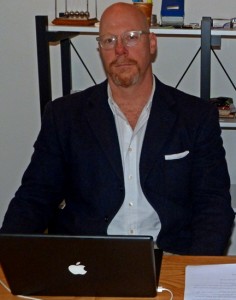 The DFWatch interview: Mark Mullen
The DFWatch interview: Mark Mullen
In an interview with DFWatch, Mark Mullen notes that the main problem in Georgia is a lack of transparency at the senior levels. In terms of corruption, he thinks that there is no so-called elite corruption in Georgia, but still there is less transparency ‘at the top’. Regarding the media, he says that both government controlled and other channels have the same problems: there are many important issues they don’t cover. The main problem with online media, as he sees it, is that they often fail to give the source of information.
Mark Mullen has been living in Georgia since the late 90s. Comparing the Shevardnadze period with today’s situation he thinks that it’s much better now than it was before 2003. The government has done a lot of good things, but a there are still problems in the country. In his opinion, a Georgian billionaire’s sudden appearance is very good for the country. It’s a chance to have real political competition, which is good.
Corruption
DFWatch: You have been at Transparency International Georgia for many years, and this organization is working on reducing corruption. So, first of all, could you tell us, generally, what you think is the main problem in terms of corruption in Georgia?Mark Mullen: I don’t like the word ‘corruption’ very much, because when you start talking about corruption you are essentially accusing somebody, and you sort of end the conversation with them, with the person that you’re accusing. And I don’t like to do that. I try to avoid doing that, and so I prefer to talk about transparency, and I think that there are some issues related to transparency. I mean especially at the senior levels, at the high levels of the economy. It’s difficult to know what’s going on. There are a lot of informal communications between business and government. It means it’s sort of difficult for somebody on the outside to intervene into that. I think it’s a systemic problem. Saying that somebody is corrupt or not, which is I think a way a lot of people in Georgia look at it, when you talk about corruption you say that these are the corrupt people, and then there are the not corrupt people, we need to replace the corrupt people with the uncorrupt people. I just don’t look at it that way. I think that there needs to be more transparency, especially at the high levels of the economy and government. At the regular levels, where the most of us live and work, the corruption is pretty much gone. Tell me if I’m wrong, but sort of administrative corruption at the public registry, civil registry, police… it doesn’t really exist anymore.
DFW: So have we developed in this direction? Because there was corruption at the level of ordinary people before Saakashvili’s presidency, and now we have the so-called ‘elite corruption’.MM: I don’t like that term ‘elite corruption’. I think it’s different. There is an elite corruption in Azerbaijan; there is an elite corruption in Ukraine. In those places somebody will say – I will give you the tender if you put 20 million dollars in a bank in the British Virgin Islands. I don’t think that happens here. I think that there is a lot of informal communications among the very senior most-leadership of business and the government about what the best way; the best arrangement is for different people to do staff. I’m not saying, it’s good, but calling it corruption implies that it’s happening specifically in order to get somebody rich and I don’t think that’s a case in here. Maybe I’m wrong and many people will disagree with me, but I don’t think that happens in Georgia. It’s just systemically there is not enough transparency at the top. You look at these gigantic companies, that either wins tenders of big utilities or something like that and you cannot tell who owns them. They’re registered in maybe islands somewhere; so it’s not clear who owns the economy.
DFW: To get rid of such problems do we need more transparency?MM: I believe so, yes. I think if you know who owns everything… For instance, on the internet try and find out who owns the Tbilisi water supply, the company, which runs the Tbilisi water supply; if you can figure out who are the people, who own it… I can’t do it. You can look around the internet all you want, you can’t figure it out. You can look around the public registry and you can’t figure it out. So I think that’s the problem, and once you know, who those individuals are, than they’re held to a higher standard, because it’s clear. If there’re any problems, everybody knows who these people are.
DFW: Are there any steps taken by the government in this direction? For example an amendment has been made to Georgian legislation, that had been initiated form civil sector, and as a result of this amendment we will be able to know who the owners of media units are.MM: I think that’s great, in this sector a fantastic thing was done. We need to keep doing it. There is a lack of transparency in all of those things. In every sector it’s a big problem, and what was done is quite important.
DFW: But do such things happen in other sectors?MM: I don’t see any great push by anybody to open these things out. Transparency International is working hard but… There are examples like the multilateral lenders, the World Bank, IMF, EBRD, and IFC… They could push harder in order to have Georgia be more transparent in terms of ownership. I don’t think it’s something that most people worry about. It’s not about the regular citizens and it’s not something that they care so much about.
Media
DFW: Do you follow TV channels? Like government-controlled channels or the others?MM: I don’t have a television but I have a pretty good idea of what’s on those.
DFW: Do you think Maestro and Kavkazia are independent?MM: I don’t know what independent means. I mean, nobody’s independent. To look at it one way – there are media companies that exist on advertising and they’re not independent from their advertisers. For example Al-Jazeera, which is essentially run by the Emir of Qatar, is not independent of that Emir. So the definition of independent is a complicated one. I see a lot of good things that the Georgian government does, which everyone agrees that are good ones. I don’t ever hear Maestro or Kavkazia saying – ‘here is a good thing that the government of Georgia did’. I just don’t hear that. At the same time I do hear criticisms of the government on the government controlled stations – Imedi, Rustavi 2, but not much. There is a lot of more sensitive topics that they don’t really cover and also I think especially Imedi and Rustavi 2 cover a lot of incredibly boring stories, like government leaders trips, they’re talking to some foreigners, they go to some village, opens a little factory of something – these are not just very important. I think that there are a lot of very important issues that are not covered very well by both sides. I think that the standards of investigative journalism are pretty bad here.
DFW: What about the other media units? Like online-media or press?MM: I think that the Georgian language information often is not very well-sourced. If you read the articles in Georgian or translations of them it’s hard to know what they’re saying. There’s not either a clear point; very often very important facts are left out; there are often a lot of information that are not attributed, they don’t say the source. I think that the quality of international journalism about Georgia is better, but by foreigners usually (not always but usually) who sometimes are not very well informed of what’s going on here. In my view the best journalism is the radio journalism. I think that there is a very good journalism here. But I don’t know how influential it is.
Mark Mullen has been making an audio podcast about Georgia (a released periodically series of audio or video files available for download or subscribe to). It’s an audio format show with three hosts and sometimes with guests. His 45 minutes shows are released weekly, and usually contains a discussion of the most important developments in the country. Hosts and guests openly express their opinion and discuss the available information about the issues.
DFW: How long have you been making this project?MM: I have been doing this project since there have been podcasts, six years or something like that. But I just re-launched it with a new format about a year ago. It’s now three of us. We chat a lot and sometimes we have the guests to talk about.
DFW: Who are your guests?MM: It’s somebody interesting. We never have Georgian guests. I try to keep it to be foreigner guests, because Georgians are already on TV a lot. I try to have somebody who knows something interesting. Original reason I did this podcast is because almost no foreigners speak Georgian. There’s some, very few, because it’s such a difficult language. There are some foreigners that live in Georgia and just only know their area and they don’t know anything else about politics, economics or anything else, what’s going on. So the idea was that it was for the foreigners so that they could know what’s happening politically, what people are talking about with a little bit of context of information. I think it’s provided that, and it’s much more successful than I had thought. What I find is, there’s a lot of Georgians who listen to it.
DFW: Mostly who are your listeners?MM: The listeners are foreigners in Georgia, foreigners outside of Georgia. Some of them official people with foreign ministries or things like that. It’s also the relatives of people who live here and want to find out what’s going on to understand things. But we also have a lot of Georgians who live abroad and a lot of Georgians who live in Georgia. We get some e-mails, and a lot of them are story ideas, criticism and things like that.
DFW: I like the fact that you express your positions very openly.MM: Yes. That’s a big part of that. The people on the show are able to openly express their positions. Especially William and I. Most of the foreigners here, they in one way or another are paid by their government or some multilateral and they can’t really speak very openly. They will in private but they can’t publicly. There are just a very few foreigners that are able to say whatever they want without getting in trouble from somebody, from the embassy or something. What I’m saying there are mostly my own opinions of course. For example on television you can’t hear foreigners speak very critically of this or that and the people will think that foreigners never complain and actually they complain a lot.
DFW: Who are the other two working with you on the show?MM: One is Camrin Christensen who works at the Eurasia, she’s been here quite a while and Will Dunbar, who’s also been here for several years, very knowledgeable smart and funny guy, freelance journalist. I’ve known Camrin for years, she has worked at Transparency International for a while and we’ve been friends for a long time and Will I’ve met more recently, but he’s very well known in the international community.
DFW: You said you’ve been doing this project for many years. I know that you’ve been living in London for a while. What was the show about then?MM: When I was in London the show was still about Georgia. I’ve only doing this project about Georgia.
Life in Georgia
DFW: Why did you decide to stay here? I know you’ve been living really in many countries.MM: Yes. I lived in Palestine, in Japan, London, a bunch of other places. But I just really like Georgia, I care a lot for this country. Foreigners usually come to a country for two or three years, sometimes four but usually two or three years and I found after I’ve been here for about four years, I would meet people and they’re saying: ‘oh, you’re still here?’ and I’m saying: ‘yes, I’m not going anywhere. I’ve got a house here, I like it here’. And suddenly they are more honest with me like “chveneburi situacia” (our kind of situation). And I got brought in a little bit more. This was a time when the government was changing in 2003.
One thing that is different in Georgia – there are places like London, San-Francisco, New York, Paris, where people will just go and hang out there, because they like it. But most other places don’t have people like that, in Moscow or Baku or in Bucharest or Johannesburg. If you’re a foreigner living there you probably have a specific reason for living there. But in Georgia there are really a lot of foreigners that live here because they just like it. It’s beautiful, Tbilisi the great city, great food, people are nice, why not? So it’s not that I decided to spend the rest of my life here, but I just never found a really good reason to leave.
I’m from Dallas, Texas and it’s not a very exciting place, frankly. I mean, I love New York, I’m American and America’s great but I think that Georgia is so historical, so interesting, so dynamic, there’s so many things are happening here, you’re seeing the changes here. When I go to Dallas it’s exactly the same as it was 30 years ago. I feel that I have a lot to contribute here. I feel like I can do something for this place. I know it quite well, I know people here and I really care a lot about this place.
DFW: Do you think the situation has improved? You were living here in the late 90s.MM: Yes, I moved here in 1997.
DFW: Can you compare the situation?MM: Oh it’s so much better, so much better here, and it’s a little bit frustrating that I have lots of criticism to this government, I write the articles, I have a column in Liberali, I criticize the government all the time, and there’s a lot of things they do that I don’t like. But anyone who will not admit that it is a thousand times better now than it was in the Shevardnadze period, I don’t have much time for them, because it is much better. Not by every standard, not every standard. But 98% of any possible way you can look at it.
There are big challenges ahead for Georgia. I’m not sure how they’re going to be solved. I was here in 2003 and in 2003 people was really worried. There were a lot of people who were saying that ‘you are deluded, you are crazy, this is not a democracy in Georgia, it is not going happen, you can’t do it, and you’re wasting your time’. But I had confidence that Georgia could do that and they did. The Rose Revolution was fantastic – nobody was hurt. The Georgian public did it. I know that Putin and a bunch of others pretend that it was something like CIA and Soros conspiracy. But everybody who was here then knows that the Georgian people did that and they did a great thing, a fantastic thing that everybody should be proud of and that’s great. Being a part of that was fantastic.
DFW: Can you tell us a few things about Bidzina Ivanishvili’s appearance?MM: I think it’s great. I don’t know him. I hadn’t met him, and at some point I’m sure I will but he said some strange things. I think he’s not so used to politics and getting into public. But I think having some political competition here is good. I think it’s a little sad how excited the opposition is, showing him up as Jesus showed up on a mountain. I mean it illustrates something not so good about it and I think also the way that the government has gone crazy like these two guys in Sakrebulo (Tbilisi City Council) who lost their position. It’s just ridiculous. All of these different things like money laundering at Cartu Bank and a million different problems don’t speak very well to the government’s confidence. They’re scared, and I don’t think they have much reason to be scared. Having a big other political player in here is good for Georgia. I think what we too much not have in here is a sort of an interesting policy discussion. I’m kind of waiting when we will start talking about some issues and I hope that will happen.
Mark Mullen is a chair of supervisory board at Transparency International Georgia, an organization committed to combating corruption in Georgia through the promotion of transparency and accountability. Mullen comes from Dallas, Texas, and first moved to Georgia in 1997 as head the branch of the National Democratic Institute (NDI) a non-governmental organization promoting democracy worldwide. In 2006-2007 he was a Sloan Fellow at London Business School before returning to Georgia.

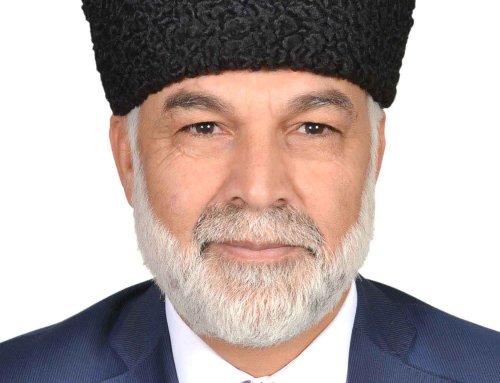
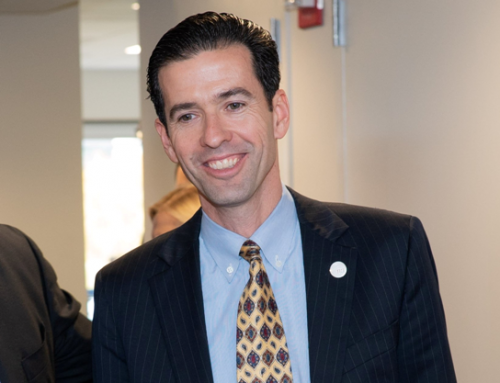
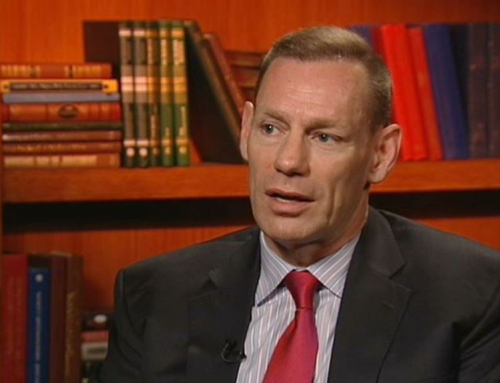
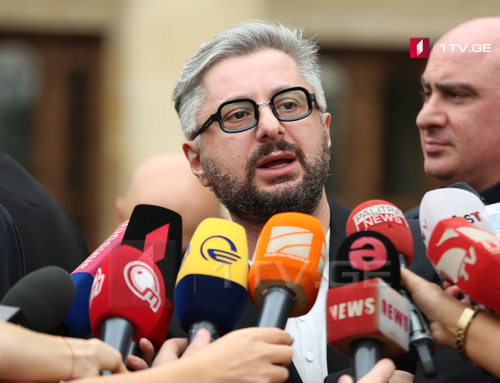
Leave A Comment
You must be logged in to post a comment.